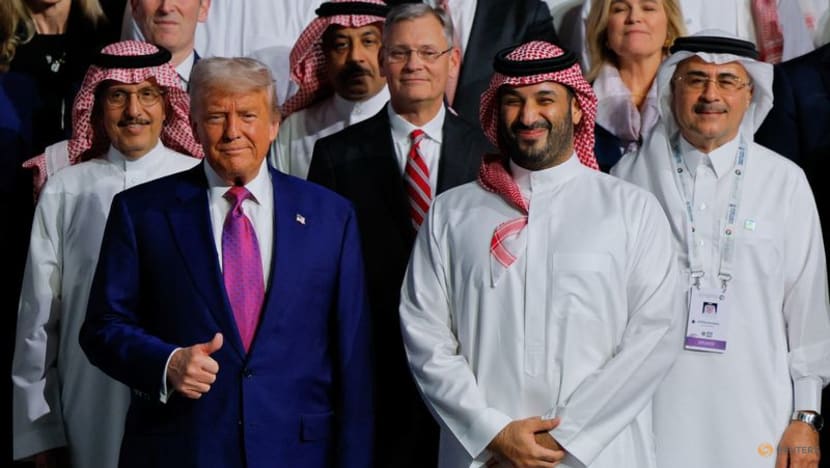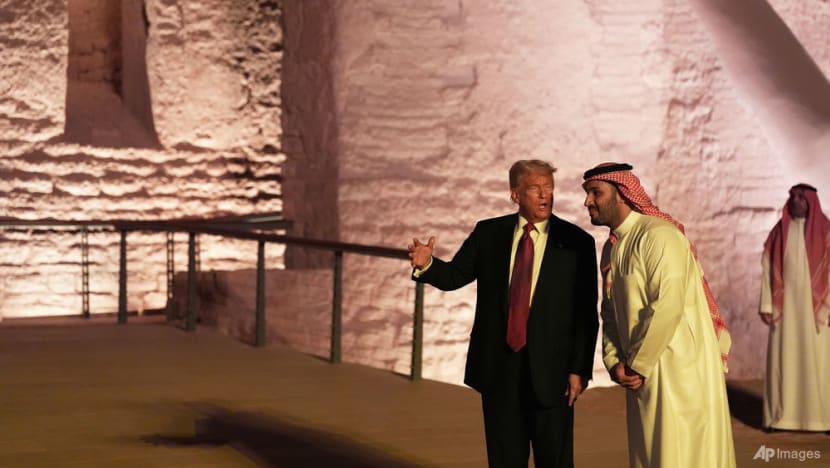America First agenda features big in Trump’s Middle East trip, say observers
US President Donald Trump is accompanied by leaders of tech giants on his four-day trip to Saudi Arabia, Qatar and the United Arab Emirates.

U.S. President Donald Trump and Saudi Crown Prince Mohammed Bin Salman pose for a group photo during the Saudi-U.S. Investment Forum, in Riyadh, Saudi Arabia, May 13, 2025. REUTERS/Brian Snyder

This audio is generated by an AI tool.
Just a day into his Gulf tour, United States President Donald Trump’s agenda for his first foreign visit since taking office is clear – it is all about the money, said observers.
Shortly after arriving in Riyadh on Tuesday (May 13), Trump already secured a US$600 billion investment pledge that included a massive US$142 billion arms deal from Saudi Arabia.
Like his first presidency in 2017 – when he struck up warm ties with the Saudi ruling family, Trump picked the kingdom for his first major overseas trip.
Now in his second term, it appears the US president hopes to cement and develop those links – which are mostly economic – further, said Georgetown University professor Nader Hashemi.
“It's always about himself first, then his family's business interests, and then those of his friends’,” said the associate professor of Middle East and Islamic politics.
Trump is accompanied on the trip by US business leaders including billionaire Elon Musk and other tech honchos.
Jessica Genauer, a senior international relations lecturer at Flinders University, highlighted Trump’s emphasis on business and financial gains that shape his foreign policies.
“This focus on the Gulf countries … Trump is showing the (US) domestic audience that he can bring that turnaround in the economy which so much underpinned his America First agenda,” she told CNA938.
Such foreign investments will also provide some relief from the pinch Trump could already be feeling back home, brought about by his global tariff blitz which could be affecting small businesses that make up part of his support base, Genauer added.
END TO SYRIA SANCTIONS
Amid business dealings, Trump made a surprise announcement that he would remove all sanctions against Syria, saying it was time for the country to move forward.
“(While) this trip is primarily about financial deals and the economic side of things, at the same time, Trump is aware that he needs to give something geopolitically to his Gulf counterparts in order to show good will and to increase that relationship,” said Genauer.
She added the move allowed Trump to shift attention away from expectations to comment on the conflict in Gaza, where hopes for a resolution seems bleak.
Hashemi called the lifting of Syrian sanctions the “only positive thing” from Trump’s speech, noting that the country will be unable to start the process of rebuilding otherwise.
However, he pointed out it will take “many generations, in the best of circumstances” for Syria to get back on its feet after more than 50 years under the Assad family's dictatorship that was toppled last December following 13 years of civil war.
“I think this is very much part of a coordinated plan … to bring Syria under the orbit of Saudi Arabia and move it away from Iran … which was one of the major external actors in Syria for a very long time,” Hashemi said.
SKIPPING ISRAEL
Trump has not scheduled a stop in nearby Israel, a decision that has raised eyebrows about where the close ally stands in Washington's priorities.
Hashemi said that despite the appearance of a snub, the US and Israel “see eye to eye” on most major issues. He noted that Trump is unlikely to sanction Israel or use the US’ veto power in the United Nations to stop the country’s actions in Gaza.
“The relationship is still very firm, but Trump realises he doesn't want to get dragged into another Middle Eastern war,” he told CNA’s Asia First.

Even between Saudi Arabia and Israel, Hashemi said that while there are differences over the war in Gaza, the two nations share similar readings of other challenges such as Iran, the Muslim Brotherhood and popular movements seeking to transform the Middle East.
He pointed out that prior to the Oct 7, 2023 Hamas attack on Israel that triggered the current war, Saudi Arabia was ready to normalise relations with Israel.
“It's just impossible for any Arab leader to shake the hands of an Israeli leader who's indicted for war crimes by the International Criminal Court and is viewed as a pariah figure around the world,” said Hashemi.
“Saudi Arabia has to maintain some sort of public face in front of its own population if it's going to normalise relations with Israel.”
Genauer said that despite Trump’s personal affinity with Israeli Prime Minister Benjamin Netanyahu, the US president knows to play his cards.
“In this case, Trump knows that going to Saudi Arabia, Qatar, the United Arab Emirates … it's not going to be a good look if he does that straight off the back of a visit to Israel,” she said.
“Trump's whole approach to geopolitics … is more about America first – what kind of economic wins the US can get … (and also) a Trump first approach.”
Saudi Arabia is the first leg of Trump’s four-day trip to the Middle East. He is set to jet off to Qatar on Wednesday and visit UAE later this week.
















